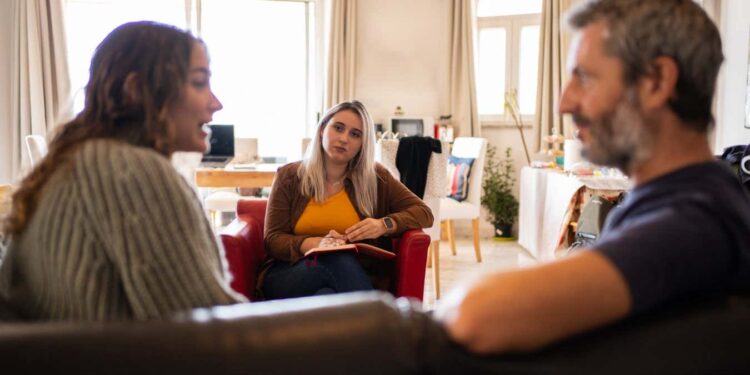
Psychoanalysts can help couples articulate their relationship problems
Carles Navarro Parcerisas/Getty Images
Love’s Labour
Stephen Grosz (UK: Chatto & Windus, out now; US: Random House, out 10 February 2026)
With their expert knowledge of the human mind and its desires, you might expect psychoanalysts’ relationships to be free from the chaos that characterises most of our romantic lives.
But about halfway through his compelling memoir Love’s Labour, a reflection on over 40 years of conversations about love with his patients, Stephen Grosz observes a messy love quadrangle involving four of his colleagues. Seemingly, Susan and Paul are happily married; so are Cora and Martin. Grosz meets the couples regularly at academic conferences, until it transpires that Paul and Cora have been having an affair for two years.
The subsequent recriminations somehow go to the very heart of their field. “I’m sorry you never learned what being a psychoanalyst is really about,” Susan tells Cora. “Having empathy. Caring for others. Repairing boundaries. Seeing reality. Not stealing a friend’s husband.” For Susan, psychoanalysis seems to be all about responsibility and self-control. Cora responds that she is doing what was necessary to fully “become herself”. In her view, the aim of psychoanalysis is conscious and deliberate self-realisation.
Grosz meditates on these contradictions, and his conclusion is enigmatic. Psychoanalysis, he says, may achieve both these goals, but it shouldn’t aim to do either. “Helping the patient, improving her well-being – these aims can disguise an unconscious wish to limit the patient’s freedom,” he writes. The psychoanalyst allows the patient to better know their own mind – but what they do with that information is their choice.
Sceptics may argue that psychoanalysis is inherently unscientific. After all, how can we test an intervention with no firm outcomes in mind? First developed by Sigmund Freud, psychoanalysis uses unstructured conversations to reveal unconscious processes driving behaviour, exchanges that may last for years and can include lengthy analyses of childhood. It is quite different from cognitive behavioural therapy, which uses exercises designed to change someone’s immediate thoughts and actions, such as strategies to “reframe” events more positively.
“
Grosz has been compared to Anton Chekhov and Oliver Sacks, which seems equally justified here
“
CBT now tends to be the first line of treatment for many mental health conditions, but clinical trials suggest psychoanalysis is effective at enhancing people’s well-being – even if that shouldn’t, as Grosz claims, be its main aim. And Love’s Labour provides a fascinating examination of this process in action, through the heartache of Grosz’s patients and acquaintances.
Consider Sophie. When Grosz meets her, she is engaged but can’t bring herself to send out wedding invitations, despite wanting the marriage to go ahead. She also has terrible dreams of her parents dying. Together, they eventually link this to her parents losing a baby before Sophie was born. She is scared of any change that might take her away from them.
Often, a person’s problems arise from a fear of losing their sense of self. “There is a vital distinction to be made between surrendering to something (or someone) and submitting to it,” Grosz writes. While submission is transactional and involves a loss of control, when two people surrender to each other, “they feel alive, empowered, accepted. They feel love.”
You won’t find simple ways to achieve this in Love’s Labour. As the title suggests, love requires constant work, as we strive to understand both ourselves and the object of our affection.
Grosz is a captivating writer whose understated vignettes often capture the complexities of the human condition. One review of his first book, The Examined Life, compared him to Anton Chekhov and Oliver Sacks, which seems equally justified here. His storytelling is at its finest when describing the entanglements of his fellow psychoanalysts. Paul and Cora stay together until Cora’s death from a fall. Grosz visits the family home as they sit shiva, a week of mourning. There, he finds Susan, comforting Paul.
It was an emblematic moment, Grosz writes, revealing all the contradictions love entails. “Susan and Paul had loved, hated, married and divorced. But even at this difficult moment, they were still a couple. Still doing love’s labour.”
David Robson is the author of The Laws of Connection: 13 social strategies that will transform your life

New Scientist book club
Love reading? Come and join our friendly group of fellow book lovers. Every six weeks, we delve into an exciting new title, with members given free access to extracts from our books, articles from our authors and video interviews.
Topics:
Source link : https://www.newscientist.com/article/mg26735590-200-what-can-psychoanalysis-teach-us-about-love-and-heartbreak/?utm_campaign=RSS%7CNSNS&utm_source=NSNS&utm_medium=RSS&utm_content=home
Author :
Publish date : 2025-09-03 18:00:00
Copyright for syndicated content belongs to the linked Source.














